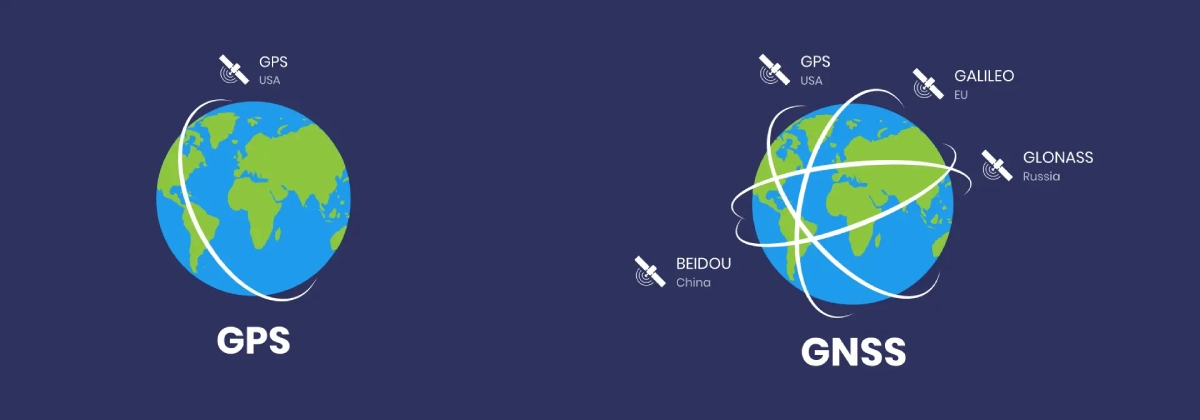
Accurate, real-time location tracking has become essential for fleet operations, logistics management, and personal vehicle security. Behind these capabilities is GNSS — Global Navigation Satellite System — a technology that powers many of the most reliable tracking and dash cam systems on the market.
At BSTA.sa, we offer a range of GNSS-enabled devices trusted by businesses across Saudi Arabia. Whether you’re monitoring a delivery fleet, preventing theft, or improving operational oversight, understanding GNSS helps you choose the right solution for your needs.
What is GNSS?
GNSS is a collective term for all satellite-based positioning systems used to determine geographic location. Unlike GPS, which refers specifically to the United States’ satellite network, GNSS includes multiple global systems working together.
* GPS (Global Positioning System) is just one GNSS system, operated by the U.S. government. GNSS devices use signals from various satellite constellations to increase positioning accuracy and reliability.
Major GNSS Systems:
- GPS – United States
- GLONASS – Russia
- Galileo – European Union
- BeiDou – China
By accessing multiple satellite systems simultaneously, GNSS-enabled trackers maintain stable, high-accuracy location data — even in challenging conditions like tunnels, construction zones, or urban areas with tall buildings.
How GNSS Works in Tracking
A GNSS tracker determines its position by receiving signals from at least four satellites. The device calculates the time it takes for each signal to reach it, allowing it to pinpoint its location, speed, altitude, and time. This data is then transmitted over a 4G or LTE network to a tracking platform.
GNSS Tracking Enables:
- Live location monitoring
- Route history and playback
- Speed and driver behavior reporting
- Geofence alerts for specific zones
- Timestamped video logging for dash cams
These features are essential for commercial vehicle oversight, personal vehicle recovery, and fleet optimization—especially in Saudi Arabia’s varied geography.
GNSS vs. GPS – What’s the Difference and Why It Matters
While many people refer to all satellite tracking systems as “GPS,” it’s important to distinguish it from GNSS. GPS is just one system, while GNSS uses multiple constellations for enhanced accuracy and dependability.
Key Differences Between GPS and GNSS:
| Feature | GPS (Global Positioning System) | GNSS (Global Navigation Satellite System) |
|---|---|---|
| Satellite Source | Single (USA) | Multiple (USA, EU, China, Russia) |
| Accuracy | ~5 meters | 1–2 meters or better |
| Coverage | Global, but less consistent | Stronger consistency worldwide |
| Performance in Cities | May struggle in urban areas | Improved with multi-system support |
| Redundancy | Limited | High fallback options for lost signal |
Why This Matters in Saudi Arabia
In cities like Riyadh and Jeddah, dense infrastructure can block satellite signals. In more remote regions like Tabuk or desert highways, signal loss can jeopardize cargo visibility or asset control. GNSS solves these problems by ensuring:
- Better signal lock
- Faster satellite acquisition
- Consistent tracking across all environments
GNSS Devices Available at BSTA.sa
At BSTA.sa, we provide high-quality GNSS-powered devices tailored for local and commercial use. These products are certified, reliable, and optimized for Saudi road and business conditions.
- Zard W18L – 4G GNSS Tracker
An industrial-grade tracker supporting GPS, GLONASS, Galileo, and BeiDou. Designed for delivery fleets, logistics, and stolen vehicle recovery, with full real-time tracking and alert systems. - Howen V8 – Dash Cam with GNSS + LTE
Combines advanced driver monitoring (DMS), video evidence, and GNSS location tracking. Trusted by ride-hailing and transport fleets for compliance, safety, and liability protection. - Jimi JC181 – Dual Dash Cam with GNSS
Compact, dual-channel dash cam ideal for light-duty fleets. Supports GNSS data for route tracking and video timestamping—perfect for incident analysis and driver training.
Real-World Applications of GNSS
GNSS isn’t just a technical improvement — it delivers real, measurable benefits for businesses and vehicle owners across Saudi Arabia:
-
Stolen Vehicle Recovery – Dammam
A delivery van fitted with the Zard W18L was recovered in less than 90 minutes after theft, thanks to its GNSS-enabled real-time location tracking. -
Ride-Hailing Safety – Jeddah
A transport company reduced customer complaints by 40% using Howen V8 to verify incidents through video and precise GNSS timestamps. -
Route Optimization – Riyadh
A logistics fleet equipped with JC181 cameras cut delivery delays by 28% after using GNSS route history to redesign their delivery maps. -
Unauthorized Movement – Al Khobar
A construction firm using geofencing with GNSS trackers was alerted instantly when a fuel truck left a job site. Management contacted the driver and avoided fuel theft. -
Insurance Dispute – Medina
A company submitted synchronized GNSS and video evidence from a Howen V8 to reject a false damage claim, saving legal time and costs.
Industries That Benefit from GNSS
GNSS devices serve a wide range of industries and applications across the Kingdom:
-
Fleet Management & Logistics
Optimize delivery times, monitor driver behavior, and reduce fuel waste. -
Ride-Hailing & Passenger Transport
Improve accountability, safety, and complaint resolution. -
Construction & Heavy Equipment
Track high-value machinery and control site access. -
Cold Chain Transport
Ensure temperature-sensitive goods are accurately tracked and delivered. -
Insurance & Leasing
Enable mileage logging, accident verification, and vehicle recovery.
How to Choose the Right GNSS Device
To select the best GNSS solution, consider these key factors:
- Usage Type: Personal, commercial, or fleet-wide.
- Connectivity: Ensure the device supports 4G/LTE networks.
- Power Supply: Choose from plug-in, battery, or hardwired models.
- Dash Cam Support: For video-linked location verification.
- Cloud Integration: Devices should work with web/mobile tracking platforms.
- Certifications: BSTA.sa provides devices compliant with Saudi CST and MOI standards.
Need help selecting the right device? Our team is ready to assist with product matching, installation, and platform setup.
Frequently Asked Questions (FAQs)
- Is GNSS more accurate than GPS?
Yes. GNSS uses multiple satellite systems, resulting in higher accuracy and more reliable location data. - Does GNSS require the internet to function?
No. GNSS calculates position offline, but real-time updates need a mobile data connection. - Can I use GNSS for my personal vehicle?
Absolutely. BSTA.sa offers affordable GNSS trackers for individuals seeking enhanced vehicle security and location monitoring. - Are GNSS devices legal in Saudi Arabia?
Yes. Most devices on BSTA.sa are certified and meet the regulatory requirements of the Communications, Space & Technology Commission (CST) and the Ministry of Interior (MOI). - What is the installation process like?
Many devices are plug-and-play, while others may require professional hardwiring for advanced features like 24/7 parking mode or tamper alerts.
Conclusion
GNSS is more than just a positioning system—it’s the foundation of today’s most advanced tracking and fleet management solutions. By combining data from multiple satellite systems, GNSS-enabled devices offer better accuracy, stronger signal stability, and wider coverage than GPS alone.
At BSTA.sa, we offer a complete range of GNSS-powered dash cams and trackers for businesses, individuals, and government-compliant applications. Whether you’re enhancing vehicle safety, protecting assets, or streamlining operations, GNSS is the technology you can trust.
Explore GNSS solutions now at BSTA.sa and take control of your vehicle or fleet like never before.



